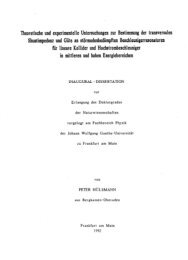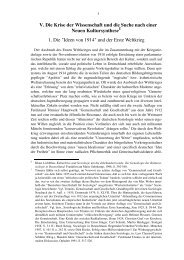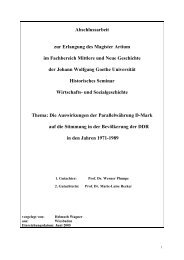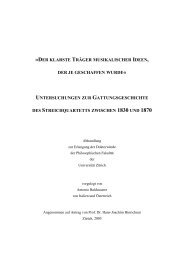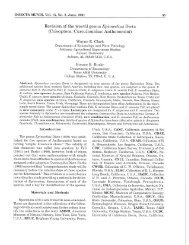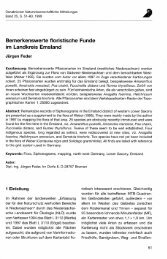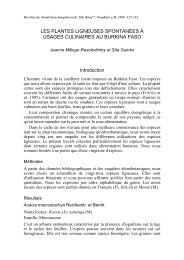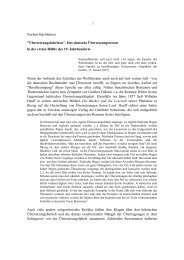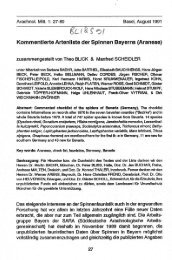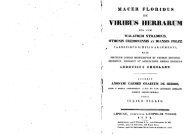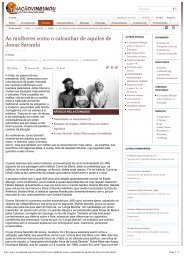- Page 1 and 2:
Life under Siege: The Jews of Magde
- Page 3 and 4:
Chapter Five: Daily Lives of Childr
- Page 5 and 6:
Abstract This regional study docume
- Page 7 and 8:
Dedication This thesis is dedicated
- Page 9 and 10:
RM Reichsmark. Unit of currency in
- Page 11 and 12:
Bund Nationalsozialistscher Deutsch
- Page 13 and 14:
Jüdische Kultusvereinigung - Jewis
- Page 15 and 16:
Polnische Juden (literally ‘Polis
- Page 17 and 18:
Union der Zionisten Revisionisten,
- Page 19 and 20:
In Magdeburg, Peter Ledermann and t
- Page 21 and 22:
xxi
- Page 23 and 24:
Concentration Camp. 2 Prior to this
- Page 25 and 26:
The History of the Community until
- Page 27 and 28:
during this period. In 1492 an argu
- Page 29 and 30:
2,356 in 1925, 20 and then dropped
- Page 31 and 32:
esmirch the Jewish effort during th
- Page 33 and 34:
possible to combine archival source
- Page 35 and 36:
surviving material with which to at
- Page 37 and 38:
In the case of reconstructing the h
- Page 39 and 40:
This thesis does not purport to she
- Page 41 and 42:
Chapter One: The Structure of the J
- Page 43 and 44:
immigrants. 8 Of this figure, 976 w
- Page 45 and 46:
Not atypically, Hemmi Freeman’s f
- Page 47 and 48:
one of the later versions of the do
- Page 49 and 50:
Magdeburg. 35 The former Synagogen-
- Page 51 and 52:
streets.’ 44 There existed, never
- Page 53 and 54:
varying periods of their own famili
- Page 55 and 56:
Wilde must be placed at the centre
- Page 57 and 58:
een Magdeburg-based, were the youth
- Page 59 and 60:
forms of bank deposits and fixed in
- Page 61 and 62:
The expenditure for social welfare
- Page 63 and 64:
quarter were still relatively low,
- Page 65 and 66:
details the financial hardship of c
- Page 67 and 68:
activities of all Jewish organisati
- Page 69 and 70:
On 23 May 1936, the Gestapa issued
- Page 71 and 72:
September 1938. 118 All property be
- Page 73 and 74:
Jüdische Bezirksdarlehnskasse on 5
- Page 75 and 76:
These dissolutions led to a number
- Page 77 and 78:
where he remained until his emigrat
- Page 79 and 80:
Wilde was also widely recognised as
- Page 81 and 82:
of synagogue sexton and was still i
- Page 83 and 84:
Not surprisingly, the social elemen
- Page 85 and 86:
every Shabbes. These people, some o
- Page 87 and 88:
ensure physical survival in the cit
- Page 89 and 90:
Regular meetings of the Magdeburg b
- Page 91 and 92:
temporary removal of antisemitic si
- Page 93 and 94:
equest and the remains were interre
- Page 95 and 96:
Hachsharah camps. In March 1934 app
- Page 97 and 98:
HAGO’s Kreisamtsleiter, neither t
- Page 99 and 100:
Chapter Two: The Destruction of Jew
- Page 101 and 102:
confirmed that prior to 1933, their
- Page 103 and 104:
though a local member of the SA sto
- Page 105 and 106:
that the number of shops willing to
- Page 107 and 108:
day-to-day goods and services. The
- Page 109 and 110:
each day and report his findings. 3
- Page 111 and 112:
usiness in Magdeburg is further con
- Page 113 and 114:
gave up the old shop and rented a c
- Page 115 and 116:
cycle up there and get the key and
- Page 117 and 118:
professionals were targeted by the
- Page 119 and 120:
children Werner and Jutta. Due to t
- Page 121 and 122:
100 public. In addition to this abu
- Page 123 and 124:
102 1938 that after 30 November 193
- Page 125 and 126:
104 were ‘non-Aryan and enemies o
- Page 127 and 128:
106 be trusted. 102 From September
- Page 129 and 130:
108 of the Reichsbürgergesetz of 1
- Page 131 and 132:
110 senior civil servant failed to
- Page 133 and 134:
112 Reichsführer SS und Chef der D
- Page 135 and 136:
114 just fewer than 50% of its orig
- Page 137 and 138:
116 Jewish business owners, either
- Page 139 and 140:
118 before experienced investment o
- Page 141 and 142:
120 Weg 73-74. They had taken over
- Page 143 and 144:
122 the knowledge of the mayor’s
- Page 145 and 146:
124 sought by all non-Jewish partie
- Page 147 and 148:
126 As the application of these rac
- Page 149 and 150:
128 far too many Jewish organisatio
- Page 151 and 152:
130 District 16 instructed that in
- Page 153 and 154:
132 On 25 September 1935, the Reich
- Page 155 and 156:
134 Reichstag had taken place. The
- Page 157 and 158:
136 reason were to be taken into cu
- Page 159 and 160:
138 In further confirmation of the
- Page 161 and 162:
140 and snowballing effects of excl
- Page 163 and 164:
142 daily affairs as though life ha
- Page 165 and 166:
144 behaviour would not be tolerate
- Page 167 and 168:
146 Rellum’s depiction of the sit
- Page 169 and 170:
148 day the Gestapa ruled that only
- Page 171 and 172:
150 licences to Jews on account of
- Page 173 and 174:
152 By the time of the pogrom their
- Page 175 and 176:
154 adult level, but seldom on the
- Page 177 and 178:
156 daughter, Inge-Ruth, had left o
- Page 179 and 180:
158 Jewish friends that ‘they [th
- Page 181 and 182:
160 In the instances where Jewish y
- Page 183 and 184:
162 from Worms to Trier over the mo
- Page 185 and 186:
164 temptations. 123 Even prior to
- Page 187 and 188:
166 Der Stürmer dedicated solely t
- Page 189 and 190:
168 Der Stürmer addressed the mass
- Page 191 and 192:
170 position of trust at the colleg
- Page 193 and 194:
172 instances this was for what wou
- Page 195 and 196:
174 article in Der Stürmer entitle
- Page 197 and 198:
176 other and capable of racial pol
- Page 199 and 200:
178 until 1938, the community felt
- Page 201 and 202:
180 Dr Kulmey, insisted that Fliess
- Page 203 and 204:
Chapter Four: Daily Life in the Pri
- Page 205 and 206:
184 the Iron Cross!” The next day
- Page 207 and 208:
186 Two. 17 The only other opportun
- Page 209 and 210:
188 I went once to Wyk auf Föhr [W
- Page 211 and 212:
190 in order to make some extra mon
- Page 213 and 214:
192 were forced to, owing to their
- Page 215 and 216:
194 emigration. 44 Jews in Magdebur
- Page 217 and 218:
196 This practice of investigation
- Page 219 and 220:
198 countries of migration. The two
- Page 221 and 222:
200 elsewhere, unmarried adult chil
- Page 223 and 224:
Chapter Five: Daily Lives of Childr
- Page 225 and 226:
204 authorities would bear no respo
- Page 227 and 228:
206 I went to Cheder with Hanni Wur
- Page 229 and 230:
208 otherwise they generally felt
- Page 231 and 232:
210 and/or gymnastics teacher had e
- Page 233 and 234:
212 Pupils were often degraded in s
- Page 235 and 236:
214 The duress of school life did n
- Page 237 and 238: 216 By the time the mayor’s offic
- Page 239 and 240: 218 Jews.’ 55 The approval for th
- Page 241 and 242: 220 emigration, the remaining Jewis
- Page 243 and 244: 222 ‘Heimat’, which had renamed
- Page 245 and 246: 224 hiking. 73 At the time of regis
- Page 247 and 248: 226 This organisation was numerical
- Page 249 and 250: 228 Despite the ideological differe
- Page 251 and 252: 230 Jewish youth in Magdeburg were
- Page 253 and 254: 232 time, the demand of the two kno
- Page 255 and 256: 234 No, I didn’t think it would e
- Page 257 and 258: 236 for emigration, the Magdeburg-b
- Page 259 and 260: 238 accepted as a Jewess in Adelaid
- Page 261 and 262: 240 A few months before I left my p
- Page 263 and 264: 242 the chaos and panic that follow
- Page 265 and 266: 244 travelling companion recalled t
- Page 267 and 268: 246 her mother was in 1942. 140 Thi
- Page 269 and 270: 248 Southampton. 154 His recollecti
- Page 271 and 272: 250 extermination camp. Approximate
- Page 273 and 274: Chapter Six: The Reichskristallnach
- Page 275 and 276: 254 The majority of interviewees re
- Page 277 and 278: The Pogrom in Magdeburg 256 On the
- Page 279 and 280: 258 Marianne, and son, Gerhard (Ger
- Page 281 and 282: 260 arrests on 10 November, his wif
- Page 283 and 284: 262 Rabbi Dr Wilde along with the m
- Page 285 and 286: 264 shawl; when he realised it was
- Page 287: 266 ‘Elsaß’ and a paint and wa
- Page 291 and 292: 270 The Reichskristallnacht was a c
- Page 293 and 294: 272 were ordered to clean up the de
- Page 295 and 296: 274 Australian government had recei
- Page 297 and 298: 276 applications for emigration for
- Page 299 and 300: 278 Samuel Freiberg’s daughter re
- Page 301 and 302: 280 woman in Magdeburg, survived th
- Page 303 and 304: 282 my parents suddenly began to we
- Page 305 and 306: 284 The entire community also worke
- Page 307 and 308: 286 premises. Expedited economic ex
- Page 309 and 310: 288 out of the question. 130 The mi
- Page 311 and 312: 290 In the wake of the pogrom and t
- Page 313 and 314: 292 small number of professionals w
- Page 315 and 316: 294 majority of Jews in Magdeburg h
- Page 317 and 318: 296 the exhibition, a commemorative
- Page 319 and 320: 298 Jewish patients only on 1 April
- Page 321 and 322: 300 the process of procuring the ne
- Page 323 and 324: 302 objects containing gold, platin
- Page 325 and 326: 304 public eye became policy. Now t
- Page 327 and 328: Chapter Seven: The Jewish Community
- Page 329 and 330: 307 the agent for Jewish emigration
- Page 331 and 332: 309 ‘Judenhäuser.’ 15 Prior to
- Page 333 and 334: 311 Jews, German Jews. There were a
- Page 335 and 336: 313 Interviewees also recalled that
- Page 337 and 338: 315 members to the community; the m
- Page 339 and 340:
317 41,434.95. 42 Additionally, twe
- Page 341 and 342:
319 By the end of 1939 all of the f
- Page 343 and 344:
321 outstanding communal work. 56 T
- Page 345 and 346:
323 In attempting to expedite the c
- Page 347 and 348:
325 In consort with those measures,
- Page 349 and 350:
327 he had escaped most abusive sit
- Page 351 and 352:
329 and conducted at the premises o
- Page 353 and 354:
331 bemoaned that breaches of the p
- Page 355 and 356:
333 quadruplicate with the owner’
- Page 357 and 358:
335 community members were reminded
- Page 359 and 360:
337 Riese née Kochmann had already
- Page 361 and 362:
339 developed a positive attitude t
- Page 363 and 364:
341 should not expect the school to
- Page 365 and 366:
343 ‘German school.’ One such e
- Page 367 and 368:
345 Owing to the pervasive hostile
- Page 369 and 370:
347 any organisation……I still m
- Page 371 and 372:
349 little doubt that there were th
- Page 373 and 374:
351 reply, on 3 July 1942, the Magd
- Page 375 and 376:
353 whose name was Ilse, and Klemm
- Page 377 and 378:
355 was not restricted in her movem
- Page 379 and 380:
357 were to lose their lives in the
- Page 381 and 382:
359 labour in the city the majority
- Page 383 and 384:
361 the exact procedures to be foll
- Page 385 and 386:
363 normal practice and as many as
- Page 387 and 388:
365 the now enlarged Reich. Unlike
- Page 389 and 390:
367 commencement of transferring ti
- Page 391 and 392:
369 On 26 February 1943, at least f
- Page 393 and 394:
371 the city. At that time, of the
- Page 395 and 396:
373 of that. They did their best. T
- Page 397 and 398:
375 This approximate total figure i
- Page 399 and 400:
377 approximately one thousand year
- Page 401 and 402:
Conclusion 378 On the eve of the Na
- Page 403 and 404:
380 spite of an effective and ongoi
- Page 405 and 406:
382 increasingly onerous as the yea
- Page 407 and 408:
384 Nuremberg Laws, this separation
- Page 409 and 410:
386 inception of the Nazi regime. N
- Page 411 and 412:
388 Reichskristallnacht, it was env
- Page 413 and 414:
390 them in Germany; for the others
- Page 415 and 416:
392 of the Jews from the city occur
- Page 417 and 418:
394 who relocated to elsewhere in G
- Page 419 and 420:
396 communal life in Magdeburg and
- Page 421 and 422:
398
- Page 423 and 424:
Archiv des Internationalen Suchdien
- Page 425 and 426:
their subsequent dissolutions; the
- Page 427 and 428:
Individual Interviews by the Author
- Page 429 and 430:
Bauer, Yehuda The Holocaust in Hist
- Page 431 and 432:
Bundesarchiv, Koblenz and der Inter
- Page 433 and 434:
Emanuel, Muriel and Vera Gissing Ni
- Page 435 and 436:
Herbert, Ulrich Best. Biographische
- Page 437 and 438:
Kundrus, Birthe and Beate Meyer, ed
- Page 439 and 440:
Nova, Fritz Alfred Rosenberg: Nazi
- Page 441 and 442:
Schmidt, Herbert ‘Rassenschande
- Page 443 and 444:
Yahil, Leni The Holocaust: The Fate
- Page 445 and 446:
Cohn, Werner “Bearers of a Common
- Page 447 and 448:
Kwiet, Konrad “The Second Time Ar
- Page 449 and 450:
Schiffres, Paul “Australia Bound:
- Page 451:
Theses and Unpublished Manuscripts




